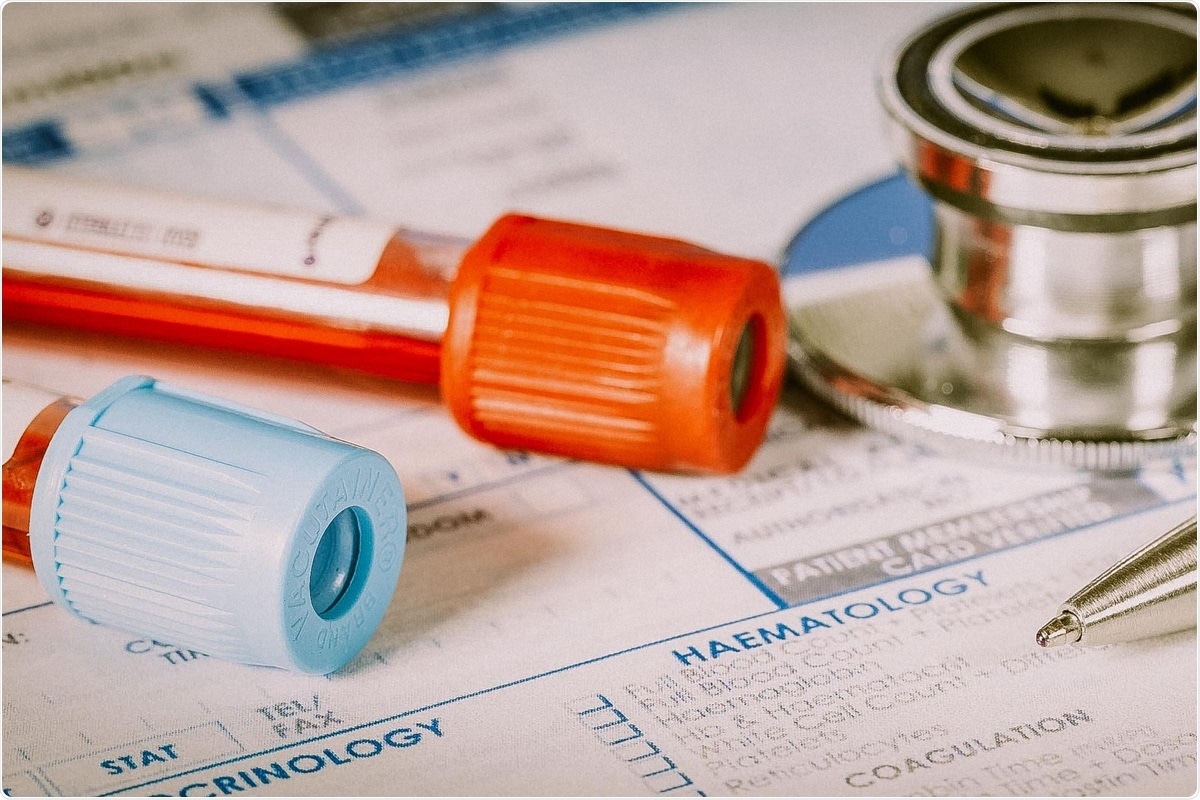In hospitalized coronavirus disease 2019 (COVID-19) patients, various studies have reported hematologic abnormalities, along with respiratory symptoms and pulmonary manifestations. These hematologic alterations have been linked to COVID-19 severity; however, their causal pathways in influencing SARS-CoV-2 manifestations are not yet established.

Study: Genetic Examination of Hematological Parameters in SARS-CoV-2 Infection and COVID-19. Image Credit: luchschenF / Shutterstock.com

 *Important notice: medRxiv publishes preliminary scientific reports that are not peer-reviewed and, therefore, should not be regarded as conclusive, guide clinical practice/health-related behavior, or treated as established information.
*Important notice: medRxiv publishes preliminary scientific reports that are not peer-reviewed and, therefore, should not be regarded as conclusive, guide clinical practice/health-related behavior, or treated as established information.
About the study
The present study aimed to determine whether genetically determined histological parameters evaluated at baseline before COVID-19 infection impacted COVID-19 susceptibility and severity.
Data from 500,000 individuals of ages between the ages of 40 and 69 were obtained from the United Kingdom Biobank (UKB). Hematological trait analysis and genotyping of custom Axiom arrays were performed on blood and urine samples collected from the participants.
Clinical cohort samples were obtained from Vanderbilt University Medical Center (VUMC), which incorporated data including procedural and diagnostic codes, data from clinical care, medications, laboratory results, and demographics like age, sex, race, and ethnicity. The team also collected COVID-19 statistics for three phenotypes, the critically ill phenotype, and the hospitalization phenotype, which functioned as a binary indicator.
Blood cell indices were evaluated from blood samples collected during in-person visits to the UKB. The correlation of each blood cell parameter with the status of SARS-CoV-2 infection and related hospitalization was assessed in the data collected from the UKB.
Hospitalized cases were defined as a case with a positive COVID-19 result, tested either when the patient was an inpatient, 14 days prior to hospitalization, during a hospital episode, or seven days post-hospital discharge.
Data collected from VUMC was also assessed for the association of blood cell parameters with positive SARS-CoV-2 tests and related hospitalizations. SARS-CoV-2 hospitalizations were defined as cases with a positive SARS-CoV-2 test in the seven days prior or 30 days after testing positive for COVID-19. Race and ethnicity were used as covariates in the analyses of case and control cohorts.
The study also assessed evidence supporting genetic association signals coincident at COVID-19 loci, which were associated with blood cell traits. The genetic correlation between the blood cell parameters and COVID-19 phenotypes was estimated using the linkage disequilibrium (LD) score regression. Furthermore, the causal effect of the various hematological traits on the COVID-19 phenotypes was estimated using Mendelian randomization (MR).
Study findings
Among the 423,358 UKB participants eligible for the study, baseline measures of 15 hematologic traits and their association with COVID-19 infection and hospitalization were assessed. In the UKB participants, the percentage of basophils at baseline was associated with SARS-CoV-2 infection, while mean cell hemoglobin levels and mean cell volumes were associated with COVID-19 hospitalization. However, no significant correlation of these hematological traits with COVID-19 outcomes was observed in 1,037,358 VUMC participants.
In the follow-up analysis, total white blood cell (WBC) counts in the VUMC were associated with both COVID-19 and related hospitalization. Red blood cell (RBC) distribution width was also related to COVID-19 hospitalization, while SARS-CoV-2 infection was associated with hematocrit levels.
Analysis of SARS-CoV-2 loci coincident with the blood cell traits found moderate linkage disequilibrium of five SARS-CoV-2-related sentinel variants, with at least one blood cell trait variant. Three of these five sentinel variants were associated with COVID-19 that overlapped RBC-associated genome-wide association study (GWAS), while severe COVID-19 illness and related hospitalization overlapped platelet and lymphocyte phenotypes, as well as the locus for monocyte count and percentage.
MR analyses found that basophil proportions were associated with COVID-19 hospitalization with notable effects of directional pleiotropy. A hematologic trait was also correlated with reported SARS-CoV-2 infection, while increased values of mean platelet volume were associated with a higher risk of COVID-19-related hospitalization. In contrast, RBCs had a negative association with the reported SARS-CoV-2 infection.
Conclusions
Despite considerable links associating blood cell traits and COVID-19-related phenotypes in SARS-CoV-2-infected individuals, the correlation between hematological parameters measured pre-infection and patient susceptibility to SARS-CoV-2 infection and disease severity was insignificant. However, the coincidence of certain genetic loci supported the association of SARS-CoV-2 infection and related severity with certain blood cell-related traits.
The researchers believed that increasing sample sizes to facilitate more balanced case-control studies will allow more definitive conclusions about the potential association of COVID-19-related outcomes and blood cell count-related variants.

 *Important notice: medRxiv publishes preliminary scientific reports that are not peer-reviewed and, therefore, should not be regarded as conclusive, guide clinical practice/health-related behavior, or treated as established information.
*Important notice: medRxiv publishes preliminary scientific reports that are not peer-reviewed and, therefore, should not be regarded as conclusive, guide clinical practice/health-related behavior, or treated as established information.